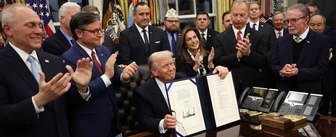(Week of 8/5/2013) American perceptions sometimes do not match official figures, especially when things are only barely looking up. The way the public views the economy is a far cry from even what has been a very slow recovery.
In the latest Economist/YouGov Poll, most Americans do not yet recognize that the unemployment rate is now lower (although just by a tenth of a point) than what it was when President Obama took office. Asked what the difference is in unemployment between now and then, more think it is higher now than it was then. Actually, it is a fraction lower: the latest rate of 7.4% is the lowest recorded during the Obama Presidency.
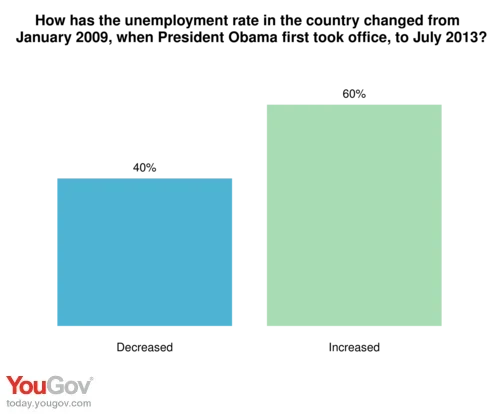
There are understandable reasons for this misperception: the unemployment rate soared to 10% the first year Barack Obama was President. It had been rising the entire year he ran for the office. Though it dropped to 7.4% in last week’s jobs report, the 10% rate at the end of 2009 was nearly three points more than it had been during the last month of the Bush Administration.
Apart from the possible confusion, politics is also at work here. There is polarization between the parties on all things Obama. For example, only 9% of Republicans approve of how the President is handling his job, compared with 77% of Democrats — a 68-point difference. So it is not surprising the Republicans take every opportunity to note that things have gotten worse on this incumbent’s watch. More than three in four Republicans say unemployment is higher now than at the start of the Obama Presidency. Democrats disagree.
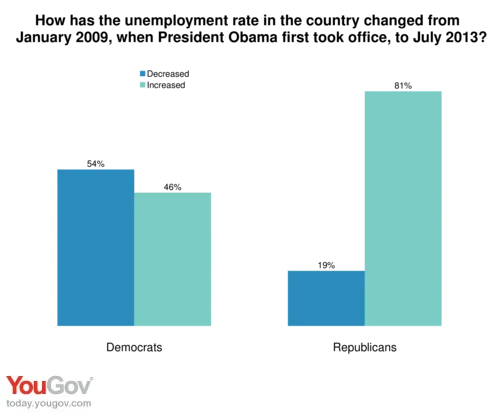
This combination of partisanship and a sluggish economy puts the Administration in an awkward position. A poor economy coupled with the increasingly high unemployment rate in his first year meant that before the first year was over, the President’s economic approval rating was lower than his disapproval rating. Which is still true today.
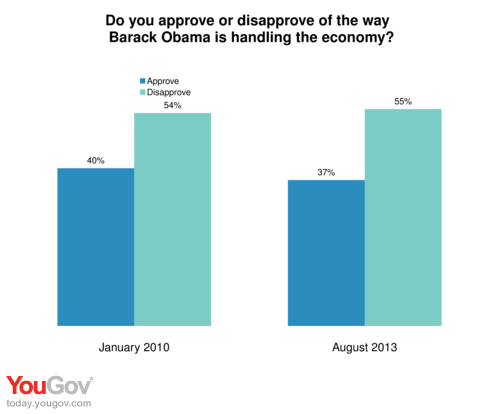
Americans simply do not believe the economy is getting better. Although things have improved since January 2009 (at least fewer people think the economy is getting worse than did so then), since then never have as many felt the economy was improving as thought it was still in decline. This week, there is a ten-point gap between the percentage thinking things are getting worse and the percentage saying the economy is improving. 27% say it is getting better, 37% say it is getting worse.

When the President won re-election in 2012, results were similar to those today. Now, just as then, they are mostly driven by the overwhelmingly negative opinions of Republicans: 62% of them say things are getting worse, and just 8% of Republicans say the economy is improving.
College graduates and those with family incomes over $100,000 a year are more positive. More in each of those groups think the economy is getting better as say it is getting worse. Majorities in both those groups also recognize that the unemployment rate today is below what the rate was when President Obama took office.
Of course, it is still the economy that Americans cite as the country’s most important problem. That has not changed in years. 35% say the economy is the country’s most important problem today. Social Security, health care and the budget deficit, although they all could be considered economic issues, rank far behind the overall state of the economy on the public’s issue list.
Many would say that the economic future is tied to the creation of jobs. So a dropping unemployment rate is only part of the solution. Individuals may leave the workforce for many reasons, including just giving up on finding a job, which many Americans have done. That alone can affect the unemployment rate.
The rate of new job creation during the Obama Administration has been sluggish, just about matching the rate since 2001, and far lower than what was seen during Ronald Reagan’s and Bill Clinton’s tenures. All of 2009 saw net job losses, and since then the average net number of new jobs has averaged about 180,000 a month. The figure was 162,000 in July.
Many Americans are not hopeful that even minimal job creation will continue. 50% of workers are somewhat worried they may lose their job (17% say they are very worried). Looking ahead six months, only 19% of Americans expect there will be more jobs than there are now; 31% expect there will be fewer. Adding in those that don’t expect any change, 72% doubt there will be new jobs created before early next year.
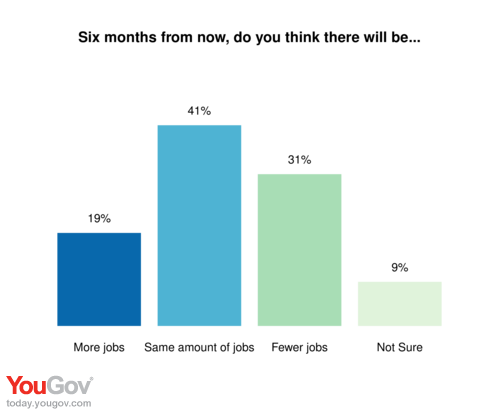
So the President continues to confront a public is dubious about job creation, unclear about the direction of unemployment, and more likely to think that things will get worse than to look on the optimistic side of the economy. Convincing them to believe something different probably will take much more than just speeches.
Economist/YouGov poll archives can be found here.
Images: Getty





